Daily Vocabulary Words: Enhance Your Lexicon with Leading Newspapers & Publications
Welcome to the Daily Vocabulary section at Wordpandit!
Our mission is straightforward: to bring you essential vocabulary words featured in top newspapers and publications worldwide. By focusing on words you’ll encounter in renowned sources, we aim to help you enhance your vocabulary effectively and practically.
Our selection includes words from:
– The New York Times
– The Washington Post
– Scientific American
– BBC
– The Guardian
– Psychology Today
– Wall Street Journal
– The Economist
– The Hindu
– The Times of India
– The Economic Times
– Hindustan Times
– Live Mint
– The Indian Express
– And many more.
We are committed to your vocabulary development. Simply visit this section regularly and explore the daily posts. This is your go-to repository for commonly used words, providing significant practical benefits by familiarizing you with vocabulary from the leading publications listed above.
Make it a habit to visit our website daily and expand your lexicon with words from top newspapers and publications.
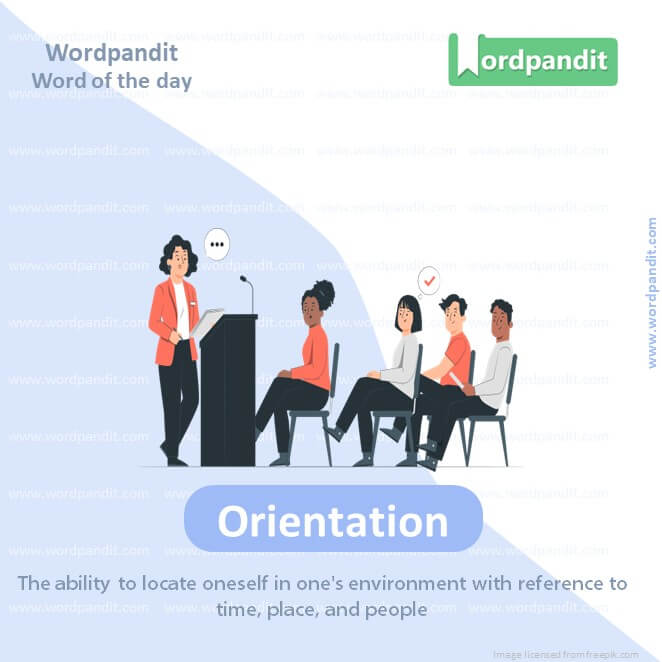
WORD-1: ORIENTATION
CONTEXT: It routinely passes judgements on not just the broad political orientation of other countries but on the micro trends within them.
SOURCE: Indian Express
EXPLANATORY PARAGRAPH: Imagine you’re playing a new game, and you don’t know where to go or what to do. “Orientation” is like when someone helps you understand where everything is and how to play. It’s like a map that shows you where to start and where to go.
MEANING: The ability to locate oneself in one’s environment with reference to time, place, and people.
PRONUNCIATION: awr-ee-en-TAY-shun
SYNONYMS: Introduction, direction, guidance, training, familiarization, briefing, acclimation
USAGE EXAMPLES:
1. The new students attended an orientation to learn about their school.
2. Before starting the job, all employees go through an orientation process.
3. She felt lost at first, but the orientation helped her understand where everything was.
4. The orientation program made it easier for visitors to find their way around the museum.
WORD-2: RESONATES
CONTEXT: The Chinese social media app TikTok has a name that resonates with a global fanbase of its short videos format.
SOURCE: Times of India
EXPLANATORY PARAGRAPH: Think about when you hear your favorite song, and it makes you feel really happy or reminds you of something special. When something “resonates,” it means it makes you feel or think deeply because it connects with you in a strong way.
MEANING: To produce a deep, strong, or meaningful response in someone (verb).
PRONUNCIATION: REH-zuh-nayts
SYNONYMS: Echoes, connects, strikes a chord, reverberates, touches, impacts, harmonizes
USAGE EXAMPLES:
1. The speech resonated with the audience, and many felt inspired.
2. Her story of overcoming challenges resonated with everyone in the room.
3. The music resonates with his emotions, making him feel understood.
4. His words resonated with her own experiences, making her feel less alone.
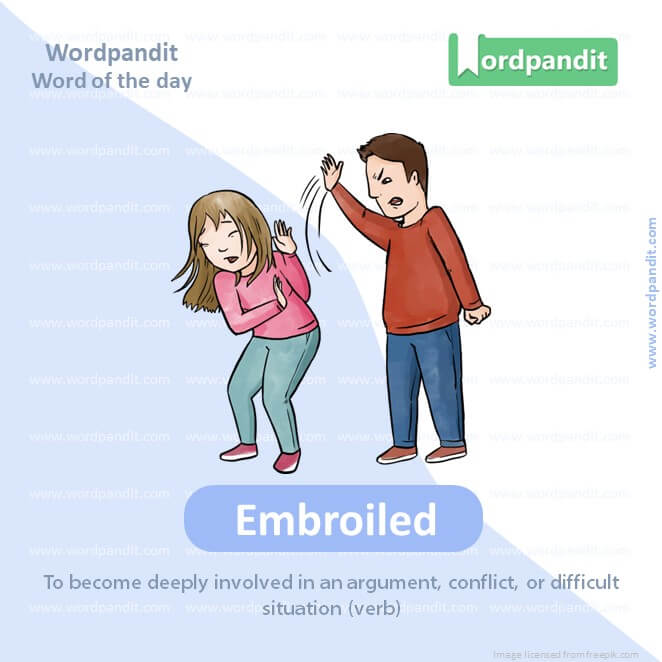
WORD-3: EMBROILED
CONTEXT: Mamata Banerjee’s starting point as talks for Bengal began, was reportedly a concession of 2 seats to Congress – even as the CM herself is embroiled in a new scandal, an attack on ED officers.
SOURCE: Times of India
EXPLANATORY PARAGRAPH: Imagine two friends are having a big argument, and you get stuck in the middle of it, even though you didn’t want to be part of the fight. When you’re “embroiled,” it means you’re caught up in a problem or situation that’s complicated and difficult to escape.
MEANING: To become deeply involved in an argument, conflict, or difficult situation (verb)
PRONUNCIATION: em-BROYL-d
SYNONYMS: Entangled, involved, caught up, ensnared, enmeshed, implicated
USAGE EXAMPLES:
1. He got embroiled in a disagreement between his friends and couldn’t find a way out.
2. The company was embroiled in a legal battle over its new product.
3. She found herself embroiled in a family argument that had nothing to do with her.
4. The politician became embroiled in a scandal that threatened his career.
WORD-4: TRANSGRESSIONS
CONTEXT: Washington punishes foreign governments for presumed transgressions against democratic norms. But what about American democracy?
SOURCE: Times of India
EXPLANATORY PARAGRAPH: Imagine you have a set of rules, like “no running in the house,” and someone breaks that rule. When someone does something they know they shouldn’t, that’s called a “transgression.” It’s like breaking a rule or doing something wrong.
MEANING: The act of breaking a law, rule, or moral code (noun).
PRONUNCIATION: trans-GRESH-uhnz
SYNONYMS: Offenses, violations, misdeeds, wrongdoings, sins, breaches, infractions
USAGE EXAMPLES:
1. The teacher reminded the students that cheating on a test is a serious transgression.
2. He apologized for his transgressions and promised to do better in the future.
3. The law punishes those who commit serious transgressions against society.
4. She felt guilty for her small transgression of telling a lie.
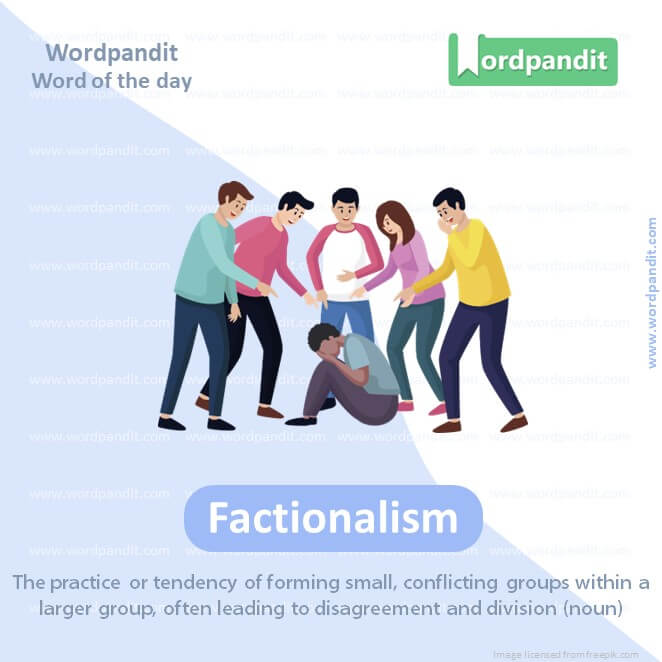
WORD-5: FACTIONALISM
CONTEXT: But can it acknowledge factionalism contributed to its losses in 2023 and will be a problem in 2024?
SOURCE: Times of India
EXPLANATORY PARAGRAPH: Imagine your class is split into two groups that keep arguing with each other all the time. “Factionalism” is when different groups within a bigger group can’t agree and keep fighting instead of working together.
MEANING: The practice or tendency of forming small, conflicting groups within a larger group, often leading to disagreement and division (noun)
PRONUNCIATION: FAK-shuh-nuh-liz-uhm
SYNONYMS: Division, infighting, discord, rivalry, disunity, schism, partisanship
USAGE EXAMPLES:
1. The team was weakened by factionalism, as different groups within it could not agree on a plan.
2. Factionalism in the organization led to many disagreements and delays.
3. The country’s politics were plagued by factionalism, making it hard to get anything done.
4. The leader tried to end factionalism by encouraging everyone to work together.
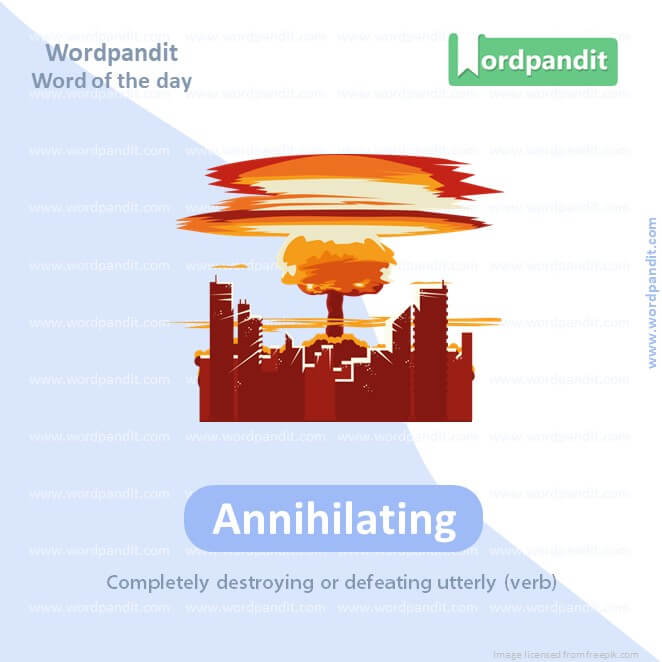
WORD-6: ANNIHILATING
CONTEXT: These onslaughts were aimed at annihilating the very foundations of our Sanatan Sanskriti.
SOURCE: Hindustan Times
EXPLANATORY PARAGRAPH: Imagine you build a big tower out of blocks, and someone knocks it over completely, so there’s nothing left. “Annihilating” means destroying something so much that there’s nothing left of it at all.
MEANING: Completely destroying or defeating utterly (verb)
PRONUNCIATION: uh-NY-uh-lay-ting
SYNONYMS: Destroying, obliterating, demolishing, eradicating, wiping out, eliminating, exterminating
USAGE EXAMPLES:
1. The army focused on annihilating the enemy’s stronghold.
2. The storm ended up annihilating the small town, leaving nothing standing.
3. She feared that the new policy would annihilate all her hard work.
4. The superhero was tasked with annihilating the evil forces threatening the city.
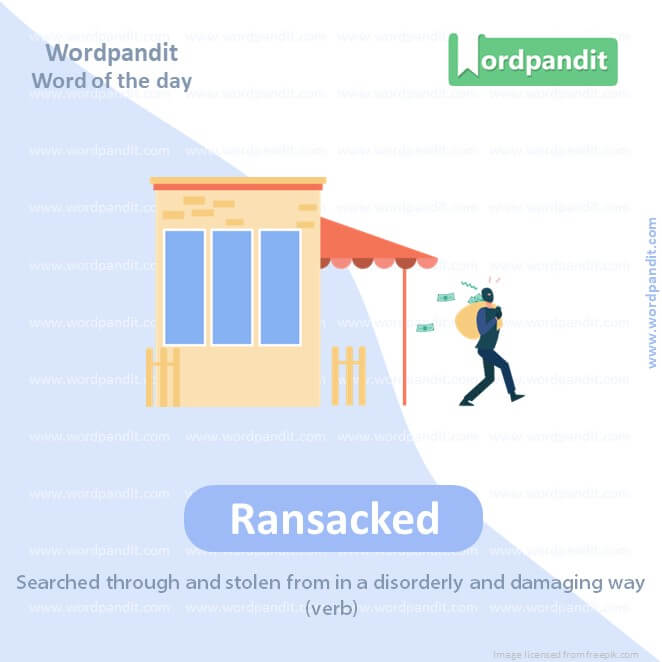
WORD-7: RANSACKED
CONTEXT: Ayodhya’s Ram Mandir was demolished by Babur’s army while Aurangzeb ransacked Kashi Vishwanath, and Krishna Janmabhumi and hewed the Vrindavan Gobind Dev temple into half.
SOURCE: Hindustan Times
EXPLANATORY PARAGRAPH: Imagine you’re looking for your favorite toy and make a big mess in your room by throwing everything around. “Ransacked” means someone searched through a place in a very messy way, often causing a lot of damage.
MEANING: Searched through and stolen from In a disorderly and damaging way (verb)
PRONUNCIATION: RAN-sakt
SYNONYMS: Pillaged, looted, searched, plundered, raided, ravaged, rifled
USAGE EXAMPLES:
1. The burglars ransacked the house, leaving everything in disarray.
2. She ransacked her closet, trying to find the perfect dress.
3. The invaders ransacked the village, taking everything valuable.
4. His room looked like it had been ransacked after he searched for his lost keys.
WORD-8: ONSLAUGHTS
CONTEXT: These onslaughts were aimed at annihilating the very foundations of our Sanatan Sanskriti.
SOURCE: Hindustan Times
EXPLANATORY PARAGRAPH: Imagine being in a water balloon fight where so many balloons are thrown at you at once that you can’t even keep up. “Onslaughts” means a strong and sudden attack that’s hard to defend against.
MEANING: A powerful and aggressive attack, often sudden and overwhelming (noun).
PRONUNCIATION: ON-slawts
SYNONYMS: Assaults, attacks, offensives, barrages, charges, invasions, raids
USAGE EXAMPLES:
1. The city struggled to defend itself against the onslaughts from the enemy forces.
2. The onslaught of homework left the students feeling overwhelmed.
3. The small business survived the onslaught of competition from larger companies.
4. They braced for the onslaught of questions after making the announcement.
WORD-9: RESURGENCE
CONTEXT: The Ram Mandir being constructed with public donations will signal the resurgence of Bharat’s sanatan sanskriti, now firmly poised to guide the world.
SOURCE: Hindustan Times
EXPLANATORY PARAGRAPH: Imagine you stop playing your favorite game for a while, but then you start playing it again with even more excitement. “Resurgence” is when something that was quiet or gone for a while comes back with new energy or strength.
MEANING: A revival or return of something after a period of decline or inactivity (noun).
PRONUNCIATION: re-SUR-juhns
SYNONYMS: Revival, comeback, rebirth, renewal, return, reappearance, recovery
USAGE EXAMPLES:
1. There has been a resurgence of interest in old video games.
2. The band’s resurgence in popularity surprised everyone.
3. After a few years of decline, the town saw a resurgence in tourism.
4. The resurgence of traditional crafts has brought new life to the community.
WORD-10: MERCENARY
CONTEXT: While some may whitewash religious motives as political or motivated by loot, the blunt reality was a mercenary mindset teeming with intolerant iconoclasm.
SOURCE: Hindustan Times
EXPLANATORY PARAGRAPH: Imagine someone who helps others only because they get paid for it, not because they care. A “mercenary” is someone who does things just for money, even if they don’t really believe in what they’re doing.
MEANING: A person who is primarily motivated by money rather than loyalty or ethics (noun); focused on making money at the expense of ethics (adjective).
PRONUNCIATION: MUR-suh-ner-ee
SYNONYMS: Soldier of fortune, hired gun, profiteer, materialistic, money-driven, self-serving, grasping
USAGE EXAMPLES:
1. The army hired mercenaries to fight in the war.
2. His mercenary attitude made him unpopular with his colleagues.
3. She didn’t trust him because of his mercenary motives.
4. The company’s mercenary practices focused only on profit and not on the well-being of its employees.
Vocabulary Today
In the dynamically evolving spectrum of language, staying updated with ‘vocabulary today’ is an integral part of mastering a language. These topical, contemporary words breathe vitality into our communication, bridging the gap between language learning and language living. But, how can we effectively learn ‘vocabulary today’?
Grasping ‘vocabulary today’ begins with exposure to contemporary contents. Engaging with current publications, social media platforms, movies, music, podcasts, and digital content can dive you into the real-world usage of ‘vocabulary today’. These platforms imbibe the vocabulary of the day, reflecting the evolution in language.
To consolidate the learning of ‘vocabulary today’, utilize memory-enhancing tools. Flashcards, language learning apps, or memory-enhancement software can make your study session an engaging venture and enhance word retention.
However, the secret sauce to learning ‘vocabulary today’ is practice. Inculcating these words in your regular dialogues, written correspondences, or social media posts will reinforce your grasp over these words. It brings you closer to ‘vocabulary today’, enhancing your language adaptability and fluency.
Better understanding of ‘vocabulary today’ can be achieved by staying connected with diverse social platforms which bring words from across locations and cultures, expanding your linguistic understanding. Also, participating in language forums, discussion groups, or language exchange platforms provides great insights into ‘vocabulary today’.
In the final analysis, staying abreast with ‘vocabulary today’ is an exciting quest that requires consistent exposure, active practice, and social engagement. As you embrace this journey, you will find your language proficiency growing with every new word, enabling you to step into the dynamic world of contemporary language with confidence and mastery. Remember, ‘vocabulary today’ is not static, it flows like a river, always fresh, always changing, and always enriching!













